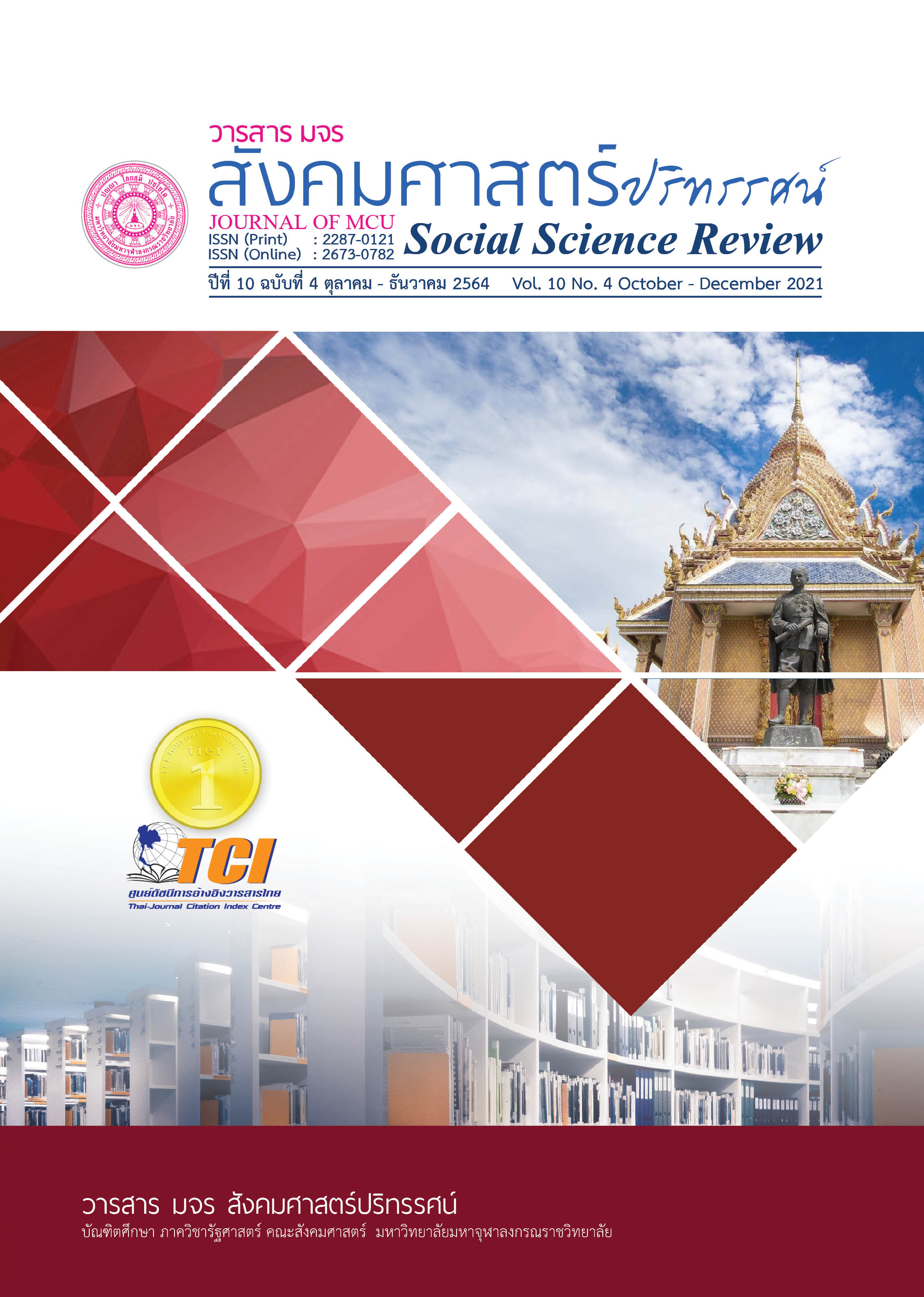ผลการจัดกิจกรรมการเรียนรู้โครงงานที่มีต่อมโนทัศน์และความสามารถ ในการถ่ายโยงการเรียนรู้เรื่องปรัชญาของเศรษฐกิจพอเพียง ของนักเรียนชั้นประถมศึกษาปีที่ 5
คำสำคัญ:
กิจกรรมการเรียนรู้โครงงาน, มโนทัศน์, การถ่ายโยงการเรียนรู้, เศรษฐกิจพอเพียงบทคัดย่อ
การวิจัยครั้งนี้มีวัตถุประสงค์เพื่อ 1) เปรียบเทียบมโนทัศน์เรื่องปรัชญาของเศรษฐกิจพอเพียงของนักเรียนชั้นประถมศึกษาปีที่ 5 ก่อนและหลังการจัดกิจกรรมการเรียนรู้โครงงาน และ 2) เปรียบเทียบความสามารถในการถ่ายโยงการเรียนรู้เรื่องปรัชญาของเศรษฐกิจพอเพียงของนักเรียนชั้นประถมศึกษาปีที่ 5 ก่อนและหลังการจัดกิจกรรมการเรียนรู้โครงงาน เป็นการวิจัยเชิงทดลอง (Experimental Research) ตามแบบแผนการวิจัยก่อนทดลอง (Pre - Experimental Research) แบบกลุ่มเดียวทดสอบก่อนและหลังการทดลอง (The One Group Pretest – Posttest Design) กลุ่มตัวอย่างที่ใช้ในการวิจัย คือ นักเรียนชั้นประถมศึกษาปีที่ 5/1 โรงเรียนบ้านโคกตูม จ.ลพบุรี จำนวน 30 คน เครื่องมือที่ใช้ในการวิจัย ได้แก่ แผนการจัดการเรียนรู้ แบบวัดมโนทัศน์และแบบวัดความสามารถในการถ่ายโยงการเรียนรู้เรื่องปรัชญาของเศรษฐกิจพอเพียง วิเคราะห์ข้อมูลโดยหาค่าเฉลี่ย () ส่วนเบี่ยงเบนมาตรฐาน (S.D.) และใช้สถิติทดสอบค่าที (t-test dependent)
ผลการวิจัยพบว่า 1. มโนทัศน์เรื่องปรัชญาของเศรษฐกิจพอเพียงของนักเรียนชั้นประถมศึกษาปีที่ 5 หลังเรียนสูงกว่าก่อนเรียนอย่างมีนัยสำคัญทางสถิติที่ระดับ .05 2. ความสามารถในการถ่ายโยงการเรียนรู้เรื่องปรัชญาของเศรษฐกิจพอเพียงของนักเรียนชั้นประถมศึกษาปีที่ 5 หลังเรียนสูงกว่าก่อนเรียนอย่างมีนัยสำคัญทางสถิติที่ระดับ .05
เอกสารอ้างอิง
กุลิสรา จิตรชญาวณิช. (2563). วิธีการจัดการเรียนรู้ในศตวรรษที่ 21. กรุงเทพฯ: สำนักพิมพ์แห่งจุฬาลงกรณ์มหาวิทยาลัย.
จตุพร พงศ์พีระ. (2556). สาระวิชาหลักและทักษะเพื่อการดำรงชีวิตในศตวรรษที่ 21 สู่ (ร่าง) โครงสร้างหลักสูตรการศึกษาขั้นพื้นฐานฉบับใหม่. มหาสารคาม: มหาวิทยาลัยมหาสารคาม.
ณัฐิกานต์ รักนาค. (2552). การพัฒนารูปแบบการเรียนการสอนตามแนวคิดการถ่ายโยงการเรียนรู้เพื่อส่งเสริมทักษะและกระบวนการทางคณิตศาสตร์ด้านการแก้ปัญหาการให้เหตุผล และการเชื่อมโยงของนักเรียนมัธยมศึกษาปีที่ 1. (ครุศาสตรดุษฎีบัณฑิต สาขาวิชาหลักสูตรและการสอน). กรุงเทพฯ: จุฬาลงกรณ์มหาวิทยาลัย.
มาเรียม นิลพันธุ์. (2553). วิธีวิจัยทางการศึกษา (พิมพ์ครั้งที่ 5). นครปฐม: โรงพิมพ์มหาวิทยาลัยศิลปากร.
รัตนาลักษณ์ พันจักร. (2555). การพัฒนามโนทัศน์ทางวิทยาศาสตร์และความสามารถด้านการคิดวิเคราะห์โดยใช้วิธีการจัดการเรียนรู้แบบวัฎจักรการเรียนรู้ 7 ขั้น โดยเน้นการใช้คำถาม เรื่อง น้ำและอากาศ ของนักเรียนชั้นประถมศึกษาปีที่ 3. (ครุศาสตรดุษฎีบัณฑิต สาขาวิชาหลักสูตรและการสอน). ปทุมธานี: มหาวิทยาลัยราชภัฏวไลยอลงกรณ์.
ลัดดา ภู่เกียรติ. (2544). โครงงานเพื่อการเรียนรู้: หลักการและแนวทางการจัดกิจกรรม. กรุงเทพฯ: คณะครุศาสตร์ จุฬาลงกรณ์มหาวิทยาลัย.
วิจารณ์ พานิช. (2555). วิถีสร้างการเรียนรู้เพื่อศิษย์ในศตวรรษที่ 21 (พิมพ์ครั้งที่ 3). กรุงเทพฯ: มูลนิธิสดศรี-สฤษวงศ์.
สมฤดี แจ้งข่าว. (2561). ผลการใช้วิธีสอนแฮร์บาร์ตที่มีต่อต่อมโนทัศน์และการประยุกต์ใช้ความรู้เศรษฐศาสตร์ของนักเรียนมัธยมศึกษาปีที่ 3. (ศึกษาศาสตรมหาบัณฑิต สาขาวิชาการสอนสังคมศึกษา). นครปฐม: มหาวิทยาลัยศิลปากร.
สำนักงานคณะกรรมการพัฒนาการเศรษฐกิจและสังคมแห่งชาติ. (2550). ปรัชญาเศรษฐกิจพอเพียงกับสังคมไทย. กรุงเทพฯ: บริษัท เพชรรุ่งการพิมพ์ จำกัด.
เสาวลักษณ์ ศรีสว่าง. (2559). การศึกษาผลสัมฤทธิ์ทางการเรียนและความสามารถในการ ถ่ายโยงการเรียนรู้วิชาพระพุทธศาสนาของนักเรียนชั้นมัธยมศึกษาปีที่ 5 โดยใช้รูปแบบการเรียนการสอน SSCS. (ศึกษาศาสตรมหาบัณฑิต สาขาวิชาการสอนสังคมศึกษา). นครปฐม: มหาวิทยาลัยศิลปากร.
ดาวน์โหลด
เผยแพร่แล้ว
รูปแบบการอ้างอิง
ฉบับ
ประเภทบทความ
สัญญาอนุญาต
ลิขสิทธิ์ (c) 2021 วารสาร มจร สังคมศาสตร์ปริทรรศน์

อนุญาตภายใต้เงื่อนไข Creative Commons Attribution-NonCommercial-NoDerivatives 4.0 International License.
เพื่อให้เป็นไปตามกฎหมายลิขสิทธิ์ ผู้นิพนธ์ทุกท่านต้องลงลายมือชื่อในแบบฟอร์มใบมอบลิขสิทธิ์บทความให้แก่วารสารฯ พร้อมกับบทความต้นฉบับที่ได้แก้ไขครั้งสุดท้าย นอกจากนี้ ผู้นิพนธ์ทุกท่านต้องยืนยันว่าบทความต้นฉบับที่ส่งมาตีพิมพ์นั้น ได้ส่งมาตีพิมพ์เฉพาะในวารสาร มจร สังคมศาสตร์ปริทรรศน์ เพียงแห่งเดียวเท่านั้น หากมีการใช้ภาพหรือตารางหรือเนื้อหาอื่นๆ ของผู้นิพนธ์อื่นที่ปรากฏในสิ่งตีพิมพ์อื่นมาแล้ว ผู้นิพนธ์ต้องขออนุญาตเจ้าของลิขสิทธิ์ก่อน พร้อมทั้งแสดงหนังสือที่ได้รับการยินยอมต่อบรรณาธิการ ก่อนที่บทความจะได้รับการตีพิมพ์ หากไม่เป็นไปตามข้อกำหนดเบื้องต้น ทางวารสารจะถอดบทความของท่านออกโดยไม่มีข้อยกเว้นใดๆ ทั้งสิ้น





